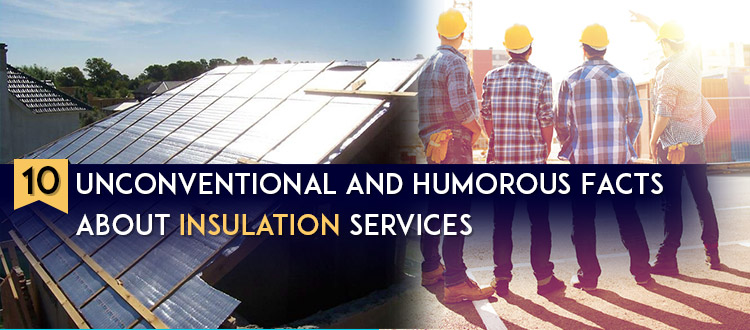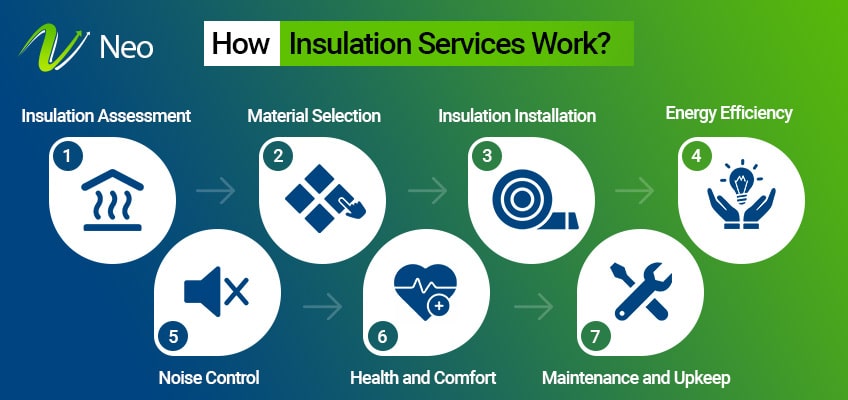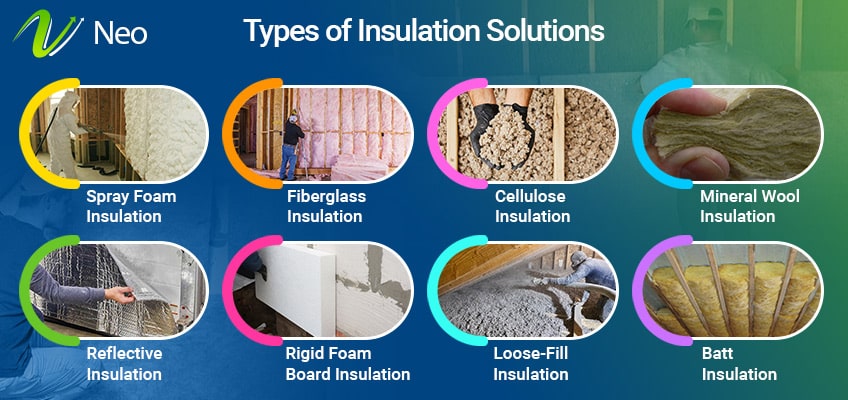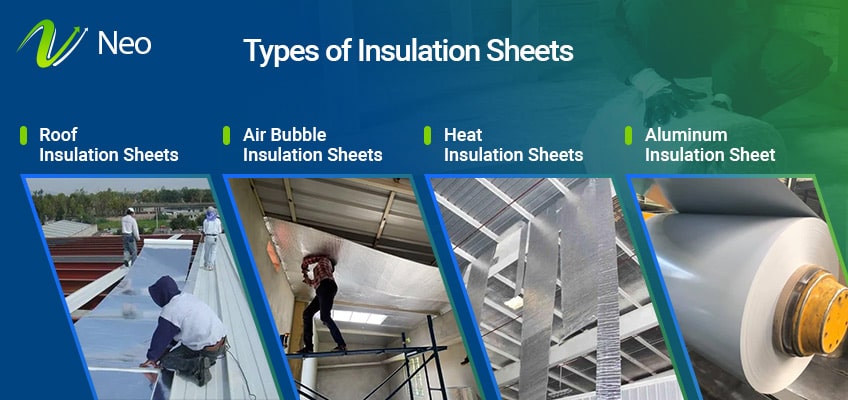Insulation Services-10+ Facts About Insulation

Every home deserves to be a sanctuary, and insulation services play a crucial role in making that dream a reality. Forget drafty winters and sweltering summers – insulation acts as a silent guardian, trapping heat in when it’s chilly and keeping it out when the sun blazes. But wait, there’s more! This unsung hero also shields you from the modern-day plague – noise pollution. Imagine layers of protection whispering “shhh” to unwanted sounds, creating a peaceful oasis within your walls. Yet, amidst its undeniable benefits, fascinating facts about insulation often go unnoticed. Let’s peek behind the curtain and uncover the hidden wonders of this essential home comfort service!
The anticipated growth in the global building insulation market is projected to add $4.6 billion to its value from 2021 to 2026. Valued at $28 billion in 2021, this sector within the construction industry is expected to reach $33 billion by 2026. The significance of insulation lies in its contribution to sustainable construction practices, effectively curbing heat transfer and enhancing the energy efficiency of buildings. Join us in this article as we explore the top 10 intriguing facts about insulation services.
What is insulation services?
Insulation services, specifically home insulation services, encompass a range of expert solutions geared towards enhancing the energy efficiency, comfort, and sustainability of residential structures. Insulation refers to the material or combination of materials used to slow down or prevent the transfer of heat, sound, or electricity between different spaces or materials. These services involve the installation and maintenance of materials within buildings or structures to regulate temperature, reduce energy consumption, and control sound transmission. These services play a crucial role in creating comfortable, energy-efficient, and acoustically sound indoor environments.
How does Insulation Services work?
1. Insulation Assessment
Insulation contractors begin by conducting a thorough assessment of a building’s insulation needs. This involves considering factors such as climate, building design, and energy efficiency goals.
2. Material Selection
Thermal Insulation services begin with the selection of appropriate insulation materials. Common insulation materials include fiberglass, cellulose, foam board, spray foam, mineral wool, and reflective foil, each with its own unique properties and applications.
3. Insulation Installation
Insulation contractors expertly install the selected materials to create a barrier against heat loss or gain. This process involves placing insulation in walls, ceilings, floors, and other areas where energy transfer occurs. Proper installation is crucial for the effectiveness of the insulation.
4. Energy Efficiency
Insulation contributes to energy efficiency by reducing the need for excessive heating or cooling. This, in turn, can lead to lower energy consumption, decreased utility bills, and a reduced environmental impact.
5. Noise Control
Multi-layered insulation materials also provide a shield against noise pollution. Insulation contractors use these materials strategically to create barriers that absorb or reflect sound, resulting in a quieter indoor environment.
6. Health and Comfort
Professional Insulation services contribute to the overall health and comfort of occupants by preventing drafts, controlling humidity, and minimizing the infiltration of allergens and pollutants. This is particularly important for individuals with respiratory conditions.
7. Maintenance and Upkeep
Insulation contractors may offer maintenance services to ensure that insulation continues to perform optimally over time. This can include periodic inspections, repairs, or upgrades as needed.
Types of Insulation Services
1. Spray Foam Insulation
This involves spraying a liquid foam that expands into a solid, providing an effective seal against air infiltration. Spray foam insulation is versatile and can be applied to various surfaces and irregular spaces.
2. Fiberglass Insulation
Fiberglass insulation consists of fine glass fibers and is widely used for its affordability and fire-resistant properties. It is available in batts, rolls, and loose-fill forms.
3. Cellulose Insulation
Made from recycled paper or plant fibers, cellulose insulation is an eco-friendly option. It can be blown into cavities or installed as loose-fill, providing good thermal resistance.
4. Mineral Wool Insulation
This insulation type is derived from natural minerals like basalt or recycled slag. Mineral wool is known for its fire resistance and can be used in various applications, including batts, blankets, and loose-fill.
5. Reflective Insulation
Reflective insulation materials typically consist of a reflective surface that reflects radiant heat. This type of insulation is often used in attics to control the transfer of radiant heat.
6. Rigid Foam Board Insulation
Rigid foam boards are made from materials like polystyrene, polyisocyanurate, or polyurethane. These boards provide high thermal resistance and are suitable for walls, roofs, and foundations.
7. Loose-Fill Insulation
Loose-fill insulation, such as blown-in fiberglass or cellulose, is installed by blowing or pouring loose insulation material into cavities, attics, or other enclosed spaces.
8. Batt Insulation
Batt insulation comes in pre-cut panels or rolls and is typically made of fiberglass. It is designed to fit between standard spacing in framing, making it a convenient option for walls and ceilings.
Types of Insulation Sheets
The insulation sheets play a crucial role in enhancing energy efficiency, maintaining optimal temperatures, and contributing to overall comfort within living and working spaces. This exploration into the “Types of Insulation Sheets” seeks to shed light on the characteristics, applications, and advantages of these materials, empowering homeowners, builders, and insulation enthusiasts with the knowledge needed to make informed decisions about their insulation needs.
1. Roof Insulation Sheets
Roof insulation sheets plays a pivotal role in creating a thermally efficient and comfortable living space. The choice of insulation sheets is a crucial aspect of roof insulation services, contributing to energy savings and enhanced home insulation.
2. Air Bubble Insulation Sheets
Air bubble insulation sheets have gained popularity as an innovative and effective solution for thermal insulation in various applications. These sheets, often comprised of layers of reflective foil and trapped air pockets, offer a range of benefits that make them a preferred choice in the realm of insulation.
3. Heat Insulation Sheets
Heat insulation sheets are essential components in creating energy-efficient and comfortable environments by preventing the transfer of heat. These sheets, designed with specific thermal properties, find applications in various industries, construction projects, and home improvements.
4. Aluminum Insulation Sheets
Aluminum insulation sheets represent a sophisticated solution in the realm of home insulation services, combining the versatility of aluminum with the thermal properties essential for effective insulation. These sheets, often composed of aluminum foil layers and other insulating materials, offer unique advantages in enhancing energy efficiency and maintaining optimal indoor temperatures.
Facts About Insulation Service
Thermal Insulation services, often delivered by skilled insulation contractors, go beyond the contemporary understanding of regulating temperature and reducing energy consumption. Insulating your home is not just about keeping the energy bills in check; it’s a fundamental aspect of creating a warm and comfortable living space. However, there are several misconceptions surrounding insulation, and it’s crucial to grasp the key facts. Here are 13 intriguing facts about insulation that should be on your radar:
1. Recyclable and Reusable
Insulation is a recyclable and reusable heating solution, contributing to sustainability. Materials like cellulose insulation are crafted from 85% recycled paper product, making them eco-friendly choices for maintaining a warm home. This recycling process transforms post-consumer and post-industrial paper waste into a high-performance insulation material. By utilizing recycled materials, cellulose insulation reduces the demand for new resources, promoting a circular economy.
2. Easy Insulation Installation
When it comes to enhancing the comfort of your home and achieving significant energy savings, installing insulation stands out as a simple and easy. The process of insulating your home doesn’t require complex procedures or extensive renovations, making it an accessible and impactful home improvement option. In the realm of sustainable construction and responsible energy consumption, insulation stands out as a simple yet powerful tool.
3. Cost-Effective
Insulation services offer a cost-effective investment for slashing energy bills. Despite the initial cost that may seem substantial, insulation services prove to be a wise financial decision. The investment pays for itself within five to six years and continues to generate savings over its impressive 40-year lifespan. Recognizing insulation as more than just an upfront expense, this strategic financial move becomes evident as it significantly curtails energy bills, showcasing a swift return on investment.
4. Energy Bill Savings
By investing in top-notch Thermal insulation, you can enjoy significant savings. High-quality insulation can potentially cut down utility bills by as much as 40%. Given that heating and cooling makeup about 54% of typical utility costs, choosing the right insulation services becomes a smart approach to managing expenses and avoiding unnecessary energy waste. This underscores the considerable financial impact of effective temperature regulation on household spending.
5. R-Value Measurement
Integrating top-tier thermal insulation services into your home can lead to significant savings. The implementation of optimal insulation has the potential to achieve a remarkable 40% reduction in utility bills. Given that heating and cooling account for 54% of average utility expenses, choosing the Professional insulation services emerges as a potent strategy to manage costs and curtail energy wastage. This emphasizes the considerable financial impact that efficient temperature regulation, facilitated by high-quality insulation, can exert on overall household expenditures.
6. Reduces Carbon Dioxide
Insulating a house not only lowers energy demand but also reduces carbon dioxide emissions. By decreasing energy needs, insulation contributes to a greener world by curbing a major contributor to global warming. This natural air pollutant is a major contributor to global warming and climate change, so by using insulation you’ll be lowering your carbon footprint and contributing towards a greener world.
7. Varieties in insulation service
People often misunderstand that insulation is only a one-step process and has no variety. But actually, insulation service has over 10 varieties. Such insulation services include insulation with the help of spray foam, blown fiberglass, injection foam, rigid barrier, cellulose, etc. The realm of Thermal insulation is far from a singular, one-size-fits-all approach. Contrary to common misconceptions, insulation offers a diverse array of options, each tailored to specific needs and preferences.These types of insulation materials span from spray foam and blown fiberglass to injection foam, rigid barrier, cellulose, and more.
Schedule a consultation for top-notch Insulation Services.
8. Better Insulation helps in better Health
As we discussed before, asbestos was an earlier solution to insulation. But later, it was discovered that asbestos had permanent harmful effects on the human lungs. So, there was an immediate need to replace it with a safer insulating material. Thus, fiberglass came into existence and it became a quick success. As a result, we use it today in all Professional insulation services.
Thus, Fiberglass is one of several accidental inventions. Maybe if this accident hadn’t happened then we would be still using harmful asbestos for insulating services.
9. Upgraded Insulation can increase your home’s value:
Installing new insulation not only contributes to energy bill savings but can also enhance your home’s market value. Elevating your home’s Energy Performance Certificate from a D to a C has the potential to boost your house value by 3%. Furthermore, achieving an increase of two bands could result in an impressive 8.8% rise in your property’s overall value.
10. Coloring insulation material for better results
Many people simply install insulation material and think that it’s all they need to do to save energy. But very few realize that coloring the sheets will improve the insulation capacity. A dark color will help it to absorb more heat and increase the insulating ability. On the other hand, a lighter color will help it to reflect a lot of heat and maintain a low temperature.
Schedule Your Insulation Installation Today.
Conclusion
In summarizing this discourse on insulation services and unveiling compelling facts about insulation, it’s resoundingly clear that insulation stands as a non-negotiable element for every household. So, from this article, we can easily conclude that insulation is a must-have for all houses. Many governments have made it mandatory for new construction.
Opting for Neo Thermal Insulation, recognized as a leader in thermal insulation services, becomes a strategic move for transforming outdated homes into energy-efficient sanctuaries. Therefore, it is a great idea to renovate all old houses with insulating materials. Insulating services are very affordable and don’t drain you by any means. They are available both offline and online. And, the companies also provide excellent after-sales support. it is a fundamental necessity for all houses. Governments worldwide have recognized its pivotal role in energy efficiency, making it mandatory for new constructions. Looking back to the pre-1980 era, when insulation wasn’t a requirement, we see a stark contrast in energy consumption and emission levels.
Frequently Asked Question
1. What are the benefits of having insulation services?
Insulation services contribute to substantial savings on heating and cooling expenses, often exceeding 40%. This reduction in energy consumption leads to lower utility bills, making it a cost-effective investment for homeowners and businesses alike.
2. which company provide the Professional insulation services?
Neo Thermal Insulation is the best insulation company in India that provides top insulation services for diverse sectors like Warehouses, Manufacturing Industries, Commercial, Domestics, Apartments, Malls, Fitness Training Centers, etc. In the services include roof thermal insulation, complete building insulation, ceiling insulation, floor insulation, etc. They have a team of insulation constructors that analyze your building inside-out and recommend the best thermal insulation services that will provide high resistance to your building and will sustain all weather changes to keep your interior environment unchanged.
3. Where is the best place to put insulation?
Insulate every outer wall, encompassing (3A) walls that separate living spaces from unheated garages, shed roofs, or storage areas; (3B) foundation walls situated above ground level; (3C) foundation walls within heated basements. Additionally, apply insulation to floors positioned above unconditioned spaces, such as vented crawl spaces and unheated garages.
4. How long is insulation good for?
The lifespan of insulation can vary based on factors such as the type of insulation, environmental conditions, and the quality of installation. Here are general estimates for the longevity of common types of insulation:
1. Fiberglass Insulation: Fiberglass insulation, when properly installed and not subjected to damage, can last for 100 years or more. It is durable and does not deteriorate over time.
2. Cellulose Insulation: Cellulose insulation, typically made from recycled paper or plant fibers, can have a lifespan of around 20 to 30 years. However, its longevity can be affected by factors such as moisture and settling.
3. Spray Foam Insulation: Spray foam insulation has a long lifespan and is known for its durability. It can last 20 years or more, and its effectiveness is less likely to diminish over time.
4. Polyurethane Foam Insulation: Like spray foam, polyurethane foam insulation is durable and can last for several decades. With proper installation, it can provide effective insulation for 20 years or more.
5. Mineral Wool Insulation: Mineral wool insulation, made from materials like basalt or recycled slag, is known for its resilience. It can last for 50 years or more, maintaining its insulating properties.








